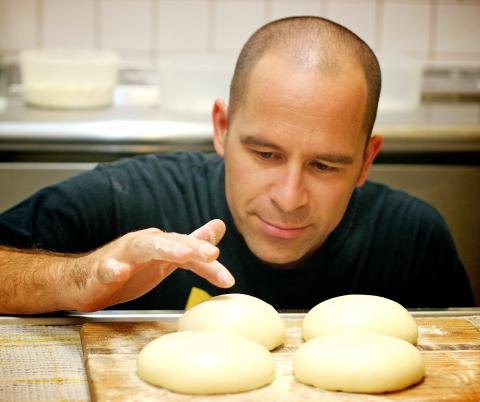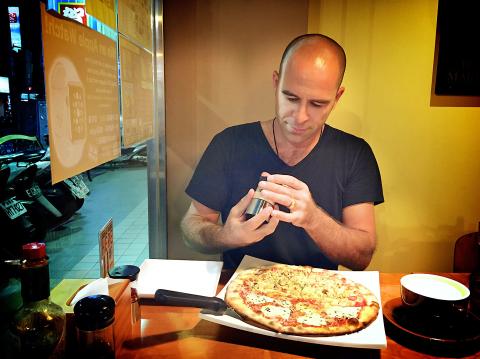When Ugo Ortolano opened his first Pizza Rock restaurant in Taichung back in 2011 he was hurriedly installing the oven and other puzzle-like kitchen components up until a few hours before the noontime grand opening.
And when the doors opened, his 50 friends, relatives and neighbors who came to taste the food were met with less than perfect pizza.
“We had burnt pizza, undercooked pizza. It was a mess,” Ortolano recalls. “We learned as we were making them.”

Photo courtesy of Ugo Ortolano
Times have certainly changed.
Fast forward five years and Pizza Rock has grown to 12 locations, including one that opened in Kaohsiung on Saturday. Ortolano and his wife, Ruby Lai (賴冠汝), own the five Pizza Rock restaurants in Taichung, while the others operate as franchises.
The challenge now is for the restaurants, some of which churn out up to 200 thin-crust pizzas a day, to remain consistent in quality. In addition to 12-inch pizzas, most in the range of NT$200 to NT$400, paninis, pastas and salads are also available.

Photo courtesy of Ugo Ortolano
RAPID SUCCESS
Part of Pizza Rock’s success is how closely Ortolano is associated with the business, says Doug Habecker, a long-term board member of the American Chamber of Commerce in Taichung.
“He’s marketed himself as the face of that restaurant,” Habecker says. Above some of the restaurants, two-story-tall advertisements feature the face of a grinning Ortolano.
Even the name Pizza Rock is easy to remember, Habecker says, adding that the yellow and white lettering on black is eye-catching.
In a tough economic climate where restaurants routinely open and close, Pizza Rock has expanded. Its success, Habecker says, is a combination of smart business people and talented chefs who know about food.
“He’s done a good job picking locations in the city,” Habecker says.
With Pizza Rock’s success, Ortolano has his eyes set on future expansion. While he doesn’t foresee any more restaurants in Taichung, he envisions upwards of 50 Pizza Rock restaurants in Taiwan, with further reach into Thailand, China and Malaysia.
“I have zero doubt that we are going to do well,” Ortolano says.
HIGH STANDARDS
Ortolano says he tries to maintain a sustainable business approach, with uniform standards for each franchised Pizza Rock. Each franchise has two owners, one for the dining area and one for the kitchen.
Shying away from popular franchise exhibitions is strategic, Ortolano says, calling such environments forced and artificial. Instead, he relies on people interested in buying into Pizza Rock to contact him directly. And even then, a deal isn’t guaranteed. Ortolano estimates he has said no to at least 30 offers.
“It starts with the people. That’s why you should only hire people you like,” he says. “One of the first questions I ask in an interview is, ‘Are you a good person?’”
For 30-year-old Wiki Huang (黃瑋奇), a manager at the Jingcheng Road (精誠路) branch in Taichung, it’s a passion for serving quality food, not just the salary, that’s rewarding.
Huang, who would one day like to open up his own pizzeria, says he views Ortolano as a business role model.
“I love the system here,” says Huang, who as a two-year employee has traveled to Cambodia and Japan on Pizza Rock’s dime. Full-time employees at Ortolano’s restaurants who have worked for one year are entitled to a free airline ticket to anywhere in Asia.
PROFIT SHARING
Another unique perk is the company’s profit-sharing program. Full-time employees at Ortolano’s five restaurants split 1 percent of the monthly profits.
“It makes a huge difference,” Ortolano says. Employees have used their bonuses to help buy new cell phones or even help pay the rent, he says. “To me it makes sense, especially if the business is doing well.”
Ortolano, 36, traces his entrepreneurial spirit to his days growing up in a traditional Canadian-Italian family. As a 5-year-old, Ortolano asked his dad for a Scooby Doo pool float. His dad said no, and told his boy he needed to earn the money by washing a neighbor’s car. Again, he heard no, this time from the neighbor. He washed the car anyway, and the neighbor paid him over double the original amount.
“It’s in my genes. For me it’s who I am,” says Ortolano, who watches positive imagery videos for personal and professional motivation.
“I use those techniques for writing affirmations,” he says. “I write with the belief that it will have a butterfly effect.”
And if Ortolano has his way, in the foreseeable future, the pizzas will continue to fly out of the oven.

June 2 to June 8 Taiwan’s woodcutters believe that if they see even one speck of red in their cooked rice, no matter how small, an accident is going to happen. Peng Chin-tian (彭錦田) swears that this has proven to be true at every stop during his decades-long career in the logging industry. Along with mining, timber harvesting was once considered the most dangerous profession in Taiwan. Not only were mishaps common during all stages of processing, it was difficult to transport the injured to get medical treatment. Many died during the arduous journey. Peng recounts some of his accidents in

“Why does Taiwan identity decline?”a group of researchers lead by University of Nevada political scientist Austin Wang (王宏恩) asked in a recent paper. After all, it is not difficult to explain the rise in Taiwanese identity after the early 1990s. But no model predicted its decline during the 2016-2018 period, they say. After testing various alternative explanations, Wang et al argue that the fall-off in Taiwanese identity during that period is related to voter hedging based on the performance of the Democratic Progressive Party (DPP). Since the DPP is perceived as the guardian of Taiwan identity, when it performs well,

A short walk beneath the dense Amazon canopy, the forest abruptly opens up. Fallen logs are rotting, the trees grow sparser and the temperature rises in places sunlight hits the ground. This is what 24 years of severe drought looks like in the world’s largest rainforest. But this patch of degraded forest, about the size of a soccer field, is a scientific experiment. Launched in 2000 by Brazilian and British scientists, Esecaflor — short for “Forest Drought Study Project” in Portuguese — set out to simulate a future in which the changing climate could deplete the Amazon of rainfall. It is

Artifacts found at archeological sites in France and Spain along the Bay of Biscay shoreline show that humans have been crafting tools from whale bones since more than 20,000 years ago, illustrating anew the resourcefulness of prehistoric people. The tools, primarily hunting implements such as projectile points, were fashioned from the bones of at least five species of large whales, the researchers said. Bones from sperm whales were the most abundant, followed by fin whales, gray whales, right or bowhead whales — two species indistinguishable with the analytical method used in the study — and blue whales. With seafaring capabilities by humans